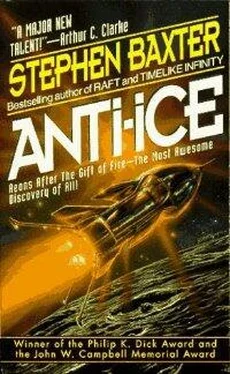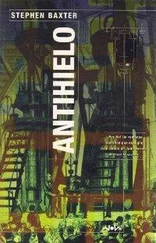Stephen Baxter - Anti-Ice
Здесь есть возможность читать онлайн «Stephen Baxter - Anti-Ice» весь текст электронной книги совершенно бесплатно (целиком полную версию без сокращений). В некоторых случаях можно слушать аудио, скачать через торрент в формате fb2 и присутствует краткое содержание. Год выпуска: 1993, ISBN: 1993, Издательство: Collins, Жанр: Фантастика и фэнтези, на английском языке. Описание произведения, (предисловие) а так же отзывы посетителей доступны на портале библиотеки ЛибКат.
- Название:Anti-Ice
- Автор:
- Издательство:Collins
- Жанр:
- Год:1993
- ISBN:978-0-246-13835-4
- Рейтинг книги:5 / 5. Голосов: 1
-
Избранное:Добавить в избранное
- Отзывы:
-
Ваша оценка:
- 100
- 1
- 2
- 3
- 4
- 5
Anti-Ice: краткое содержание, описание и аннотация
Предлагаем к чтению аннотацию, описание, краткое содержание или предисловие (зависит от того, что написал сам автор книги «Anti-Ice»). Если вы не нашли необходимую информацию о книге — напишите в комментариях, мы постараемся отыскать её.
Anti-Ice — читать онлайн бесплатно полную книгу (весь текст) целиком
Ниже представлен текст книги, разбитый по страницам. Система сохранения места последней прочитанной страницы, позволяет с удобством читать онлайн бесплатно книгу «Anti-Ice», без необходимости каждый раз заново искать на чём Вы остановились. Поставьте закладку, и сможете в любой момент перейти на страницу, на которой закончили чтение.
Интервал:
Закладка:
In the morning I awoke to bright sunlight, feeling quite refreshed, and was even able to take the few steps to my washbasin unaided. I found Traveller at the Lubbocks’ kitchen table; he was seated in an old bath chair wrapped in his own dressing-gown, brought from the Phaeton, and he was enjoying a hearty meal of bacon and farmhouse eggs. Newspapers were piled up on the table and he was working his way through them as he ate; and, despite the homely warmth of the kitchen, with the morning sunlight slanting across the floor to twinkle from the polished range, Traveller’s expression was as sour and thunderous as ever I had seen it. He looked up as one of Lubbocks willing lads helped me in and said, “Ned, it is no surprise that farmer Lubbock was mystified at our arrival. It was sheer vanity ever to suppose that our disappearance should have remained of interest for any length of time—not while Europe tears itself apart!”
Disturbed by these words, I began to go through the yellowing papers myself. They dated back to a few days before our departure on 8 August: apparently Lubbock stored the old journals to line his chicken coop. In general our disappearance had been overshadowed by its larger context—the sabotage of the Prince Albert on its launching day—and we had generally been assumed dead, lost in some chance explosion, a by-product of the assault on the ship. I was amazed to learn that it had since proven impossible to retake the Albert from the saboteurs, or franc-tireurs, who had stolen it; and, as best I could tell, it still wandered at large about the fields of Belgium or northern France like some escaped beast! The actions of the franc-tireurs had been linked to attacks on other British properties, at home and abroad; I wondered if the attempted sabotage of the Light Rail which Holden and I had witnessed at Dover had been committed by a Frenchman.
And, of course, there was no word of Françoise Michelet or the other trapped passengers of the ill- fated liner; and despite the pleasure of the Kent morning I felt my heart sink as I scanned those yards of barren newsprint.
Traveller remarked on my crestfallen expression, and asked what in particular distressed me. Haltingly—for Josiah Traveller was no sympathetic ear—I described Françoise: our meetings, and the immediate impression she had made on me. As I talked on I felt color steal into my cheeks; for what had seemed, in the privacy of my heart, to be an ethereal passion, became on the telling in this bright farmhouse kitchen a rather foolish infatuation.
Traveller listened to all this without comment. Then he said levelly: “The girl sounds like a franc- tireur herself, Wickers.” I made to protest, shocked, but he went on, “What else, if she was so thick with that wretch Bourne?” He sniffed. “If I’m correct you should waste no more sympathy on her, Ned. She is where she chooses to be.” So saying he turned to his papers again, leaving me devastated.
But, even in that first moment of shock, I perceived the plausibility of what Traveller suggested. The elements about Françoise which Holden, and even I, had noted as odd—her fascination with engineering, her angry absorption in politics—fell into place under Traveller’s hypothesis as components of a far more complex character than the girl I had idealized, and whose sweet face I had projected on to the oceans of Earth.
I wanted to curse Traveller for putting such a suggestion into my head; I cursed myself for a fool even more. But still, I was not sure. And the most galling aspect of the situation was that, with Françoise lost in war-torn France, I might never learn the truth about her.
With my heart in turmoil I turned my attention to the newspapers. Reading rapidly, Traveller and I pieced together the story of the European conflict, as reported in London, since our precipitate departure.
The war with the Prussians had gone badly for the French. Reading the harrowing accounts of battles fought and lost, it was scarcely credible to me that France, with its long military tradition, its proud heritage and its model army, should have collapsed before Bismarck’s aggression in quite such a craven way. French strategy seemed largely to have consisted of the twin Marshals Bazaine and MacMahon lurching about the French countryside in search of defensible positions and each other, while periodically losing skirmishes to the Prussians.
About the time of our enforced departure Napoleon III had left Paris for Chalons, while appointing Bazaine to the command of his Army of the Rhine. A few days later Bazaine, fearing encirclement by the fast-moving Prussians, had withdrawn to the west across the River Moselle. But near Metz he encountered two German corps and had finished up encircled after all; as we sat in our peaceful farmhouse reading about it, Bazaine’s force was still trapped in the town of Metz, invested by no fewer than two hundred thousand Prussian troops.
So much for one half of the glorious French Army. Of the rest, MacMahon’s instinct had been to stay close to Paris and so offer protection to the capital, but popular pressure, brought to bear by Parisians outraged by the violation of their precious patrie, had impelled him to a more aggressive course; and he had set off toward Metz in the hope of combining with Bazaine.
The Germans around Metz, commanded by the wily Moltke, had divided their forces. Bazaine was left trapped while the rest of the Prussians set off to meet the advancing MacMahon. MacMahon’s forces, exhausted by their difficult march, had been encircled by the Prussians at Sedan. MacMahon himself was wounded and French command lines were paralyzed.
The Army was annihilated. The French allowed 100,000 men and no fewer than 400 guns to fall into Prussian hands.
The French Second Empire collapsed in chaos. Napoleon III himself surrendered to the Prussians, and a Government of National Defense under the Governor of Paris, General Trochu, had emerged in the capital. And meanwhile two Prussian armies had advanced on Paris itself.
Even as we had landed in our Kent field, Paris, sixty years earlier Bonaparte’s capital of Europe, lay under a Prussian siege. The only hope appeared to lie with Bazaine, but he remained entrapped in Metz, and the rumors in London were that his supplies were running low. The Prussians, meanwhile, were predictably cock-a-hoop, and there was much wild speculation about plans for Kaiser William to ride in procession through the streets of conquered Paris.
I laid down the last newspaper with hands that trembled. “Dear God, Traveller. What an astonishing few weeks we have missed! Surely this humiliation of France will burn in the mind of every Frenchman for generations to come. They were already an excitable bunch—look at Bourne for an example. Surely nothing but a state of war can exist between the French and their German cousins for all time.”
“Perhaps.” Traveller lay back in his bath chair, his thin hands wrapped together over the robe which covered his belly, and he stared unseeing through the dusty windows of the farmhouse. With the sunlight catching the wisps of white hair which hovered about his skull, he looked as old and frail as I remembered him at that terrible moment when it seemed that even the Moon would not save our lives. “But it is not ‘all time’ that concerns me, Ned; it is the here and now.”
“What troubles you, sir?”
With a trace of his old irritation he snapped, “Think about it, boy; you’re supposed to be a diplomat. The Prussians have felled France. Surely even the wily old fox Bismarck cannot have foreseen such astonishing gains—and these in addition to his primary objective.”
“Which is?”
“Is it not obvious?” He studied me wearily. “Why, the unification of Germany, of course. What better way to bully and cajole the German princelings into a political union than to set up a common foe?—and how much better if that foe is the unlovely France of Robespierre and Bonaparte. I predict that we will see a declaration of a new Germany before this year is out. But of course it will amount to little more than a greater Prussian Empire, for if those petty Bavarian princes think that Bismarck, in his pomp and triumph, will allow them much say in the running of this new entity, they will be sorely disappointed.”
Читать дальшеИнтервал:
Закладка:
Похожие книги на «Anti-Ice»
Представляем Вашему вниманию похожие книги на «Anti-Ice» списком для выбора. Мы отобрали схожую по названию и смыслу литературу в надежде предоставить читателям больше вариантов отыскать новые, интересные, ещё непрочитанные произведения.
Обсуждение, отзывы о книге «Anti-Ice» и просто собственные мнения читателей. Оставьте ваши комментарии, напишите, что Вы думаете о произведении, его смысле или главных героях. Укажите что конкретно понравилось, а что нет, и почему Вы так считаете.












